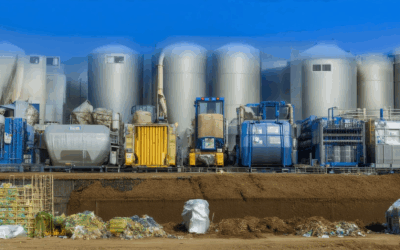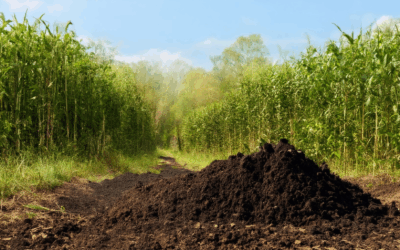Biochar, a remarkable substance derived from organic materials through controlled pyrolysis, emerges as a powerful tool in our quest for a more sustainable world. This versatile material, known for its rich history and diverse applications, plays a pivotal role in enhancing soil health and promoting environmental well-being. As we delve deeper into the realm of sustainable practices, biochar stands out as an innovative solution not only for agricultural productivity but also for combating climate change. By integrating biochar into our ecosystems, we unlock a pathway toward carbon sequestration and improved biodiversity, making it a cornerstone of sustainable practices that benefit both the planet and future generations.
Key Takeaways
– Biochar as a Natural Carbon Sink: Sustainable biochar effectively sequesters carbon dioxide and other greenhouse gases, playing a crucial role in mitigating climate change.
– Sustainable Production Practices: Eco-friendly biochar creation utilizes renewable energy, conserves water, and reduces waste, ensuring minimal environmental impact.
– Enhanced Soil Health and Agricultural Productivity: Biochar improves soil structure, boosts water retention, and increases crop yields, making it a valuable resource for sustainable farming.
– Growing Competitive Edge: The biochar industry is supported by notable players like TerraCarbon and Carbon Gold, fostering innovation and widespread adoption.

Environmental Benefits of Using Biochar
Biochar offers numerous environmental benefits, making it a valuable tool for sustainable practices. Here are some key advantages:
- Enhances Soil Health: Biochar acts as a natural amendment that improves soil structure, increases nutrient content, and boosts microbial activity. It adds essential nutrients like potassium, magnesium, and phosphorus, which promote plant growth and reduce the need for chemical fertilizers.
- Carbon Sequestration: One of the most significant benefits is its ability to sequester carbon. Biochar effectively stores carbon in the soil, contributing to carbon sinks and helping mitigate climate change by reducing greenhouse gas emissions.
- Waste Management: Produced from organic waste through pyrolysis, biochar diverts waste from landfills and transforms it into a reusable resource. This reduces the environmental impact of waste disposal and promotes a circular economy.
- Prevents Soil Erosion: Biochar improves soil cohesion, making it more resistant to erosion. This is particularly beneficial in regions prone to heavy rainfall or drought conditions, where stable soils are crucial for agricultural productivity.
- Cleaner Production Process: Compared to traditional charcoal production, biochar manufacturing is a cleaner and more efficient process that produces less smoke and pollutants, making it an environmentally friendly energy source.
- Improves Water Quality: Biochar can help filter contaminants and reduce runoff, enhancing water quality and protecting aquatic ecosystems. Its ability to absorb and retain water also supports drought resistance in vulnerable areas.
Biochar’s versatility makes it suitable for various applications, including agriculture, urban green spaces, and renewable energy production. By incorporating biochar into farming practices, individuals and communities can contribute to a healthier planet while enjoying the benefits of improved crop yields and soil resilience.
Pyrolysium is at the forefront of promoting sustainable solutions like biochar, offering educational resources and advanced technologies to maximize its potential. Visit our website to learn more about how we can help you adopt biochar for a better tomorrow: Pyrolysium.org .
Sustainable Biochar and Its Environmental Benefits
Sustainable biochar is a revolutionary solution for enhancing environmental health and promoting sustainable practices. By transforming organic waste into a high-carbon material through controlled pyrolysis, biochar acts as a natural solution to various environmental challenges.
- Soil Health Enhancement: Biochar improves soil fertility by increasing its organic matter content, which enhances nutrient availability and microbial activity. This leads to healthier plant growth and stronger ecosystems.
- Carbon Sequestration: As a carbon-rich material, biochar effectively captures and stores carbon, reducing greenhouse gas emissions and contributing to global efforts against climate change.
- Water Retention and Erosion Control: Biochar enhances soil structure, improving its ability to retain moisture and reduce soil erosion. This is particularly beneficial for dry regions and sustainable farming practices.
- Nutrient Cycling: Biochar serves as a slow-release fertilizer, providing essential nutrients to plants over extended periods. This reduces reliance on synthetic fertilizers and promotes sustainable agricultural practices.
Additionally, biochar production from organic waste diverts materials from landfills, reducing environmental pollution and promoting waste reduction initiatives. Its use in agriculture supports biodiversity by creating habitats for microorganisms and insects.
Pyrolysium advocates for the adoption of sustainable biochar technology to create a more eco-friendly future. Learn more about the pyrolysis process and how it contributes to sustainable living by visiting our dedicated pages.

How Can Environmentally Sustainable Biochar Help Mitigate Climate Change?
Biochar, produced through a controlled pyrolysis process, plays a significant role in combating climate change by acting as a natural carbon sink. Here’s how it contributes to mitigating climate change:
- Carbon Sequestration:** Biochar is rich in carbon, capturing and storing it in the soil. This reduces the amount of CO2 in the atmosphere, helping to lower greenhouse gas levels.
- Improved Soil Health:** By enhancing soil structure and fertility, biochar increases the soil’s ability to absorb and store carbon, further amplifying its climate-beneficial effects.
- Reduced Emissions:** Using biochar in agricultural practices can reduce the need for synthetic fertilizers, minimizing methane and nitrous oxide emissions commonly associated with industrial farming.
- Sustainable Production:** Produced through sustainable pyrolysis processes, biochar creation itself generates less environmental impact compared to traditional charcoal-making methods.
The production of biochar through pyrolysis, as championed by organizations like Pyrolysium , emphasizes sustainable practices that align with global climate goals. Companies like TerraCarbon and Carbon Gold also highlight the potential of biochar in creating a more sustainable future.
By integrating biochar into agricultural systems and land management practices, we can significantly contribute to reducing atmospheric carbon levels while fostering healthier ecosystems. The scalable production of biochar makes it a promising solution for combating climate change effectively.

How Effective Is Sustainable Biochar in Reducing Greenhouse Gas Emissions?
Biochar, when produced sustainably, is highly effective in reducing greenhouse gas emissions. As a carbon-rich material created through the pyrolysis of organic waste, biochar acts as a natural carbon sink, helping to sequester carbon dioxide (CO2) and other greenhouse gases.
The production process of biochar, particularly when done sustainably, minimizes environmental impact while maximizing its beneficial effects. Sustainable practices often involve using renewable energy sources and organic feedstocks, further enhancing biochar’s carbon-sequestration capabilities.
- Carbon Sequestration: Biochar can store significant amounts of carbon for extended periods, typically hundreds of years, making it a reliable method for reducing atmospheric CO2 levels.
- Greenhouse Gas Reduction: By capturing and storing carbon, biochar helps mitigate the effects of greenhouse gases like methane and nitrous oxide, which are potent contributors to global warming.
- Comparative Advantage: Unlike traditional carbon sequestration methods such as reforestation, biochar offers a more localized and scalable solution, particularly in urban settings where land availability is limited.
Sustainable biochar production aligns closely with environmental goals, as it often repurposes waste materials and uses energy-efficient processes. This approach ensures that biochar remains a viable and ethical solution for combating climate change.
For more information on how sustainable biochar contributes to reducing greenhouse gas emissions, visit our website to explore our resources and learn about the latest developments in sustainable living and eco-friendly technologies.
Factors Contributing to the Environmental Sustainability of Biochar Production
Biochar production’s environmental sustainability is influenced by several key factors:
- Resource Efficiency: Utilizing agricultural waste, forestry residues, and other organic materials reduces the need for virgin resources and minimizes environmental impact. Optimizing the pyrolysis process enhances resource utilization and lowers energy consumption.
- Renewable Energy Use: Incorporating biogas from the pyrolysis process as an energy source reduces reliance on non-renewable fuels. Facilities that generate excess electricity can sell it, adding to sustainability efforts.
- Water Conservation: Employing dry pyrolysis methods and efficient irrigation techniques minimizes water usage, preventing dehydration of the feedstock and reducing the need for additional resources.
- Carbon Sequestration: Biochar serves as a carbon sink, storing carbon in the soil and contributing to carbon negative agriculture, which helps combat climate change.
- Local Material Sourcing: Using locally sourced materials reduces transportation emissions and supports local economies, aligning with sustainable development goals.
- Waste Reduction: Minimizing waste generation through efficient processing and utilizing byproducts effectively enhances overall sustainability.
- Regulatory Compliance: Adhering to environmental regulations and obtaining certifications like ISO standards demonstrates commitment to sustainable practices and consumer trust.
- Community Engagement: Educating the public on biochar’s benefits fosters adoption and reduces the environmental impact of conventional farming practices. Collaborations with local organizations aid in waste management and resource sharing.
- Continuous Improvement: Investing in research and development ensures ongoing enhancements in efficiency, emissions reduction, and sustainability practices.

How Effective Is Biochar in Promoting Environmental Sustainability When Produced Sustainably?
Biochar has emerged as a powerful tool in promoting environmental sustainability, particularly when produced through sustainable methods. Its effectiveness lies in its ability to enhance soil health, reduce greenhouse gas emissions, and support eco-friendly agricultural practices.
Key Benefits of Sustainable Biochar Production
- Carbon Sequestration: Biochar acts as a carbon sink, storing carbon in the soil and reducing atmospheric CO2 levels.
- Improved Soil Fertility: It enhances soil structure, increases water retention, and makes plants more resistant to pests and diseases.
- Waste Management: By converting organic waste into biochar, it reduces landfill dependency and minimizes methane emissions.
- Agricultural Productivity: Using biochar can boost crop yields and overall farm productivity, making it a valuable resource for farmers.
Sustainable production methods further amplify these benefits. Processes like pyrolysis, as championed by organizations like Pyrolysium , ensure that biochar is made without harmful chemicals, making it an even more responsible choice.
Competitors and Market Leaders
While there are several players in the biochar industry, companies like TerraCarbon and Carbon Gold also contribute significantly to advancing sustainable practices. These competitors often collaborate to share knowledge and drive innovation in the field.
Conclusion
Biochar’s role in promoting environmental sustainability is undeniable, especially when produced sustainably. Its ability to sequester carbon, enrich soils, and support eco-friendly farming practices makes it a cornerstone of sustainable agriculture and waste management. By embracing biochar and sustainable production techniques, we can take meaningful steps toward a healthier planet for future generations.




0 Comments